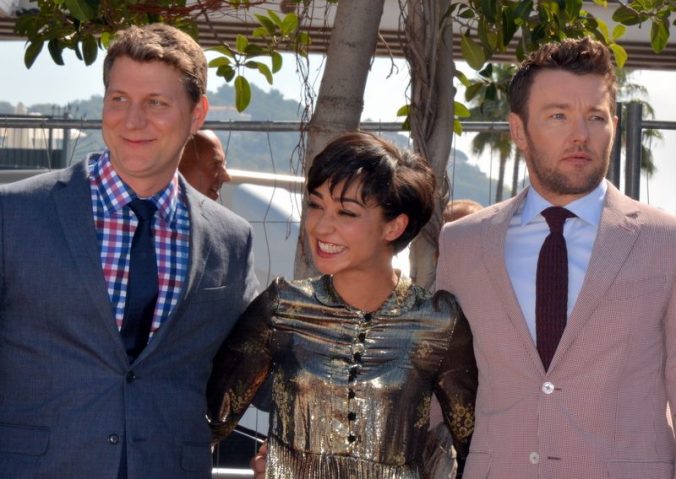According to Rotten Tomatoes (RT), the #5 best-reviewed movie of 2013 was Mud. It featured an acclaimed title-role performance by one of the bigger stars in Hollywood, Matthew McConaughey, who (by the way) won that year’s Best-Actor Oscar for the eighth-best-reviewed picture (Dallas Buyer’s Club). It also had supporting performances from Reese Witherspoon, Sam Shepard, Sarah Paulson and Michael Shannon, among other familiar actors. And it boasts a 98% “fresh” RT rating. Yet RT reports less than $22 million in box office for Mud; compare that to $274 million for Gravity, RT’s #1-ranked film in ’13, but also a blockbuster hit.

Filmmaker Jeff Nichols at a gala screening of Mud in 2013. By larry-411 (Intro, “Mud” Gala Screening) [CC BY-SA 2.0 (http://creativecommons.org/licenses/by-sa/2.0)%5D, via Wikimedia Commons
Nichols launched his screenwriting and directing career with 2007’s spare, darkly lyrical Shotgun Stories, starring Shannon and set amidst a financially and spiritually impoverished clan in a desolate-if-rather-scenic patch of mid-America (of Nichols’ home state, Arkansas, to be more specific). It established the filmmaker’s naturalistic style, his milieu in what lately the media has stereotyped as Trump country (his characters are often struggling or disappointed working-class white folks in rural regions of the central and southern U.S.), and his fascination with boys and young men groping for their meaning and purpose in the world. It only began to hint at Nichols’ mythic vision; there is a latter-day Hatfield & McCoy/Mourning Becomes Electra feel to the proceedings, and the central characters are named Son, Boy, and Kid. But it earned him a well-deserved reputation as a top-tier director of actors; small wonder that the likes of Jessica Chastain and Shea Whigham chose to join Shannon as stars of Nichols’ next feature, Take Shelter, released in 2011. Although it had the strong support of the great opinion-maker Roger Ebert, Shotgun Stories (which is now available to rent on iTunes) grossed only $45,000 at the box office, according to IMDB.
Nichols has made five movies (he wrote as well as directed them all); of the four that I’ve seen, Take Shelter is my favorite. I think Shannon, who plays a young father obsessed with protecting his family from a cataclysmic storm he mysteriously forecasts, deserved another Oscar nomination for his intense, profoundly haunted, sometimes outright-unhinged performance. The picture somehow simultaneously achieves a realistically gritty, empathetic depiction of an economically insecure working man’s inchoate terror along with an extraordinary dreamlike quality. It too got some of the best reviews of its year, but RT reports it made just $1.6 million.
From the evidence I’ve seen, Nichols has not yet created a film that’s great from top to bottom. Take Shelter‘s ending is nightmarishly ambiguous, and it tantalizes us with the filmmaker’s potential. Midnight Special‘s plot builds in a remarkably engrossing way (despite some obviously gaping holes) and its conclusion fully answers its dramatic question, but thematically it leaves us wondering what exactly was the point. If you’ve seen any of these movies it was most likely Mud, and you most likely enjoyed it a lot but you more than likely would call it derivative of everything from Tom Sawyer to Stand by Me. Whatever their imperfections, though, these are absorbing movies and every one is superbly acted by audience favorites. So why aren’t they more successful?
Maybe Nichols’ latest film, Loving, will be his commercial breakthrough. It’s a departure in that it’s a true story (of the interracial couple whose Supreme Court case forever established their right to marry even in the south). But in many ways it plays to his strengths, it stars the popular Edgerton (with, of course, Shannon in a supporting role), it too has been well reviewed, and for the first time a Nichols film seems a fairly strong candidate to win one or more major awards. So far, though, you haven’t seen it any more than I have–am I right? I’m guessing, because RT says it’s made less than $7 million gross.

Nichols with Loving stars Ruth Negga and Joel Edgerton at the Festival de Cannes.
Photo: Georges Biard [CC BY-SA 3.0 (http://creativecommons.org/licenses/by-sa/3.0)%5D, via Wikimedia
I finally saw “Loving.” There are certain movies that I resist seeing, sometimes for a very long time or forever, for reasons that I don’t fully understand. Despite all evidence to the contrary, I think the film will be boring and it seems like homework. “Loving” was one of these films. But I finally saw it and, sure enough, it was very good.
My fears about it being boring were not entirely unfounded; it wasn’t, but it was so restrained and subtle, so deliberately paced and underplayed, as to require a conscious effort at attention (an effort that is well rewarded). The superb, much-nominated leading performances (by Joel Edgerton and especially the luminous Ruth Negga) are emblematic of what is challenging and, ultimately, gently moving in the film. Just as delicate and just as beautiful is the cinematography by Nichols’ longtime collaborator Adam Stone.
In no way does this make “Loving” my favorite Jeff Nichols movie. Maybe it says more about me than about Nichols that I’ll take the histrionic pyrotechnics of the last act of “Take Shelter” all day long over the stolid restraint of the ending of “Loving.” But, for whatever reason, watching “Loving” made me want to watch “Take Shelter” again more than it made me want to watch “Loving” again.
LikeLike